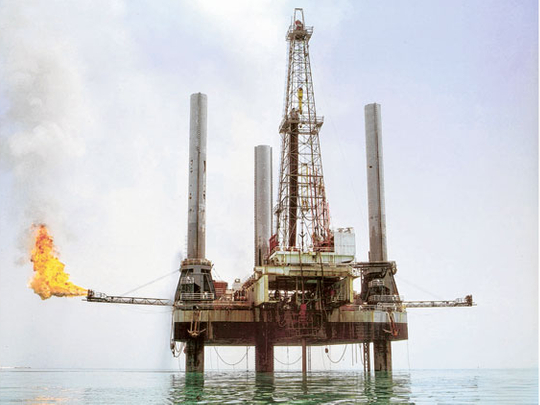
Abu Dhabi: The global demand for oil will continue to grow, reaching more than 109 million barrels per day in 2035, Ali Obaid Al Yabhouni, UAE Governor for the Organisation of Petroleum Exporting Countries (Opec), said Tuesday.
"By 2035, fossil fuels will still comprise more than 80 per cent of global supply. Gas use is expected to grow steadily to 25 per cent, while coal use is expected to remain unchanged at 29 per cent. Oil's share is bound to fall behind coal, from 34 per cent to 28 per cent of the global energy mix," Al Yabhouni said, speaking at an industry conference at the Emirates Centre for Strategic Studies and Research (ECSSR).
"It is now evident that OECD [the Organisation for Economic Cooperation and Development] demand has already peaked, and the longer term sees a steady decline in demand in all OECD regions. Eighty per cent of the increase in global demand is in developing Asia, where demand will reach almost 90 per cent of that of the OECD by 2035," said Al Yabhouni.
He added: "Such anticipated growth in demand requires a response from producers. National oil companies, such as Adnoc [Abu Dhabi National Oil Company] are investing many billions of dollars a year in building up long-term sustainable production capacity. Such investment decisions are not arbitrary. Indeed, they are the final conclusion of a long decision-making process based on economic studies, which in turn are built on the carefully researched scenarios." The UAE currently produces about 2.3 million barrels of oil per day, the bulk of which is exported.
He said the UAE's recent strategic focus on developing new oil and natural gas fields, while at the same time promoting the use of renewable energy and launching a nuclear energy programme, has turned the UAE into a regional energy hub.
Expanding portfolio
"As the UAE's vibrant economy leaps forward with industrial diversification, our demand for energy inevitably intensifies. By developing alternative energy sources, including renewables and nuclear energy, we are creating an expanded energy portfolio to satisfy our fast-growing energy needs. Of course, hydrocarbons remain the backbone of our energy industry, but by developing alternative domestic energy sources we are able to make a valuable contribution to the environment, and, at the same time maximise the amount of oil and gas available for export," Al Yabhouni added. He said it is understandable that our view of global economic growth is clouded by short and medium term uncertainty in Western nations, notably the European Union and the United States.
"However, looking at long term growth scen-arios, we can expect the world economy to grow on average by around 3.4 per cent over the next decades to 2035. One of the major shifts expected to occur is the rising share of developing countries in the world's economic activity. It is set to rise from 40 per cent in 2010 to 57 per cent by 2035, with Asian developing countries alone accounting for 43 per cent of global gross domestic product (GDP)," said Al Yabhouni.
He said that in line with this development, the strategic landscape in energy is also bound to change.
"In coming years, the trend in global energy policies is set to reduce energy intensity and improve the environmental footprint of energy use, with continued stress on increased energy efficiency and a target of higher shares of all fuels beyond fossil, in the energy mix. Already, China's latest five-year plan includes accentuated policies to ease energy import growth through demand-side management," said Al Yabhouni.












